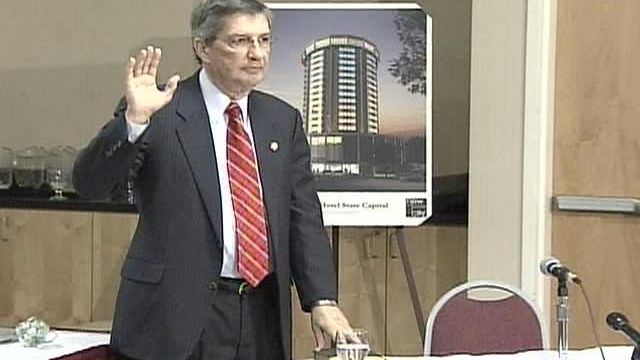Black Will Not Seek Fifth Term As House Speaker
Embattled state House Speaker Jim Black said Tuesday night he will not seek another term as speaker, ending an eight-year tenure as the top official in the state House.
Posted — Updated"I've been speaker for four terms," Black told The Associated Press. "This is, again, not about me. I don't have any need for me to be speaker forever."
Black said he has no plans now to step aside from his Mecklenburg County legislative seat, and dismissed the suggestion he decided against seeking another term as speaker because he is worried about a possible federal indictment. For more than a year, a federal grand jury has looked into the Democrat's campaign finances and his connections to the lottery and video poker industries.
"I have no more reason to think today that I'll be indicted than I did a year ago," Black said.
Black, 71, announced his decision after having dinner with about 25 House Democrats at a Raleigh restaurant. He said their focus in next year's legislative session should be on the issues facing the state, such as education and mental health - and not who is leading the party. Black added he plans to be involved in choosing his successor, a decision he doesn't expect House Democrats to make until January.
"It's wide open and everybody will make their case," he said.
Black's office has provided thousands of pages of documents to grand jurors seeking information on more than two dozen entities or persons, many connected with the lottery and video poker industries. Dozens of lobbyists, political allies and others with ties to Black or his campaign have appeared at the federal courthouse since late 2005. Many confirmed they were asked to testify before the grand jury.
In October, a federal jury convicted former state lottery commissioner Kevin Geddings, a Black appointee to the commission, on five counts of fraud. Former Rep. Michael Decker pleaded guilty in August to federal charges of accepting $50,000 to join the Democratic Party in early 2003, a move that ultimately helped Black remain speaker.
In August, Black's former political director, Meredith Norris, pleaded no contest in state court to violations of state lobbying laws. The State Board of Elections has also asked Wake County prosecutors to rule on whether Black should be charged criminally with breaking state campaign finance laws.
The board ruled in March that Black's campaign illegally accepted corporate contributions and checks with the payee line left blank. His campaign later forfeited at least $16,875 in contributions.
Rep. Ray Rapp, D-Madison, said Black's decision was "the brave and right thing" to do after the months of intense scrutiny. "I think that took a lot of courage on his part to make that decision, so I tip my hat to him," Rapp said. "History is going to show that there were some major achievements that came under his leadership, but I think it's going to take some distance to see the accomplishments that he had."
Political newcomer Hal Jordan made Black's troubles the focus of his campaign against the Matthews eye doctor, and Black ended Election Day up by just seven votes in his heavily Democratic district. After provisional ballots were counted, Black won by just 30 votes out of more than 10,000 cast.
After spending nearly $1 million in campaign funds for attorneys fees, Black had to ask fellow House Democrats for donation during his re-election bid - a stunning turnabout for the prolific fundraiser. Gov. Mike Easley and his predecessor, Jim Hunt, helped fill the money gap as Democrats ended up expanding its majority in the House by five seats.
Several Democrats distanced themselves from Black in 2006 and called on him to step down as speaker as his legal troubles grew. At least seven House members have said they will run for the chamber's top job or are exploring the idea.
One of the candidates, House Majority Leader Joe Hackney, said late Tuesday he felt sad for Black personally but respected his decision. He said he didn't know how Black's sudden departure from the race would affect the election for speaker.
"I prefer to focus on the accomplishments that we all had together over the last eight years," said Hackney, D-Orange.
Black won his first race for speaker in 1999 by a single vote, and had to forge an unlikely co-speakership in 2003 with GOP Rep. Richard Morgan when both parties won 60 seats in the House. Last month, the federal grand jury asked Morgan to testify and turn over documents related to many of the same individuals or groups mentioned in the subpoena issued to Black's office.
Black has been Easley's chief booster in getting the governor's agenda passed in the House, including the state lottery in 2005 and pre-kindergarten and class-size reduction in earlier years. But Easley said Tuesday, before Black's announcement, that he didn't want to interfere in the jockeying over who will serve as speaker in 2007.
"I think it's important for me to stay out of the speaker's race and let them come to their own choice and their own conclusions as it relates to the current speaker," Easley said. "I respect that institution too much."
Copyright 2024 by WRAL.com and the Associated Press. All rights reserved. This material may not be published, broadcast, rewritten or redistributed.





